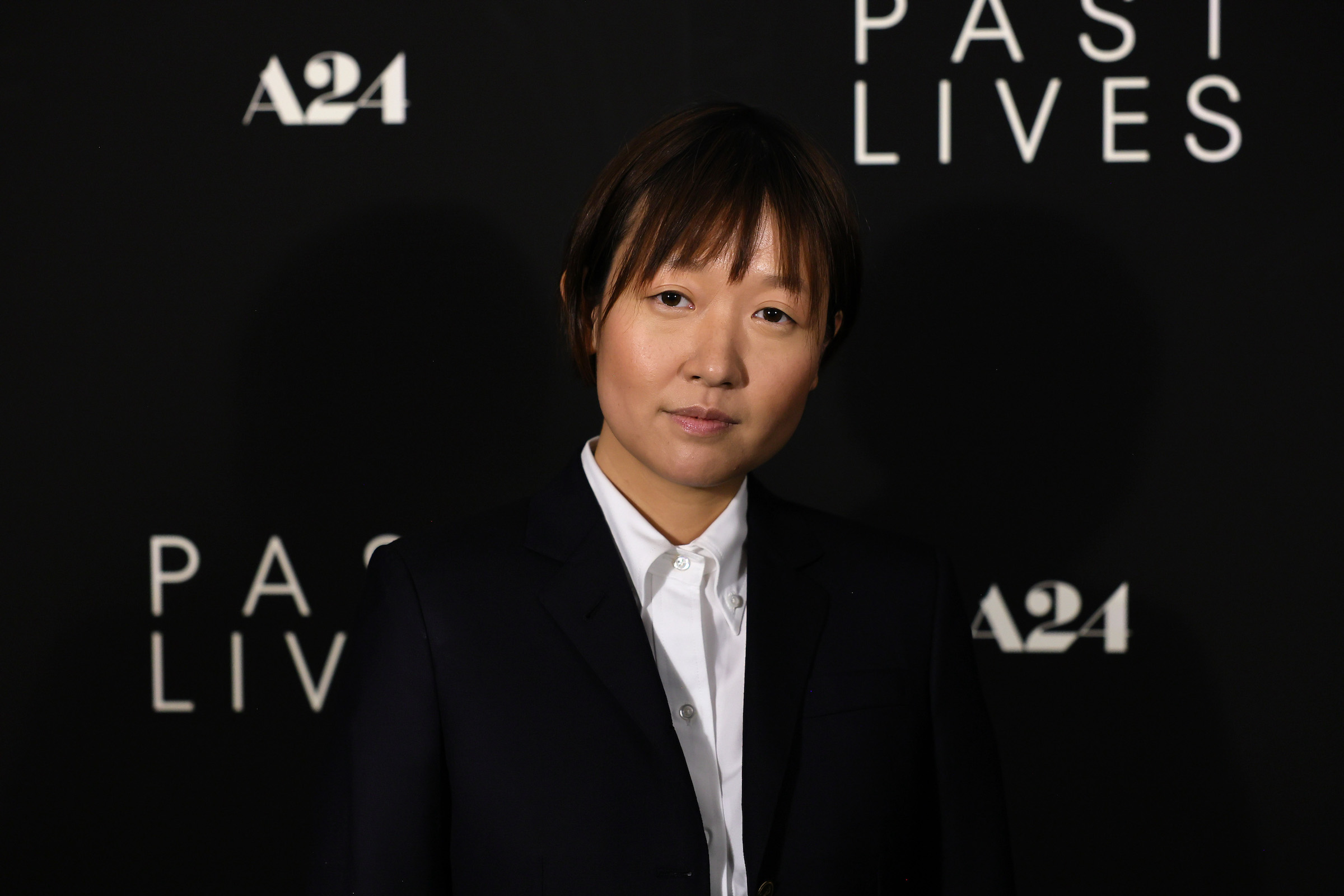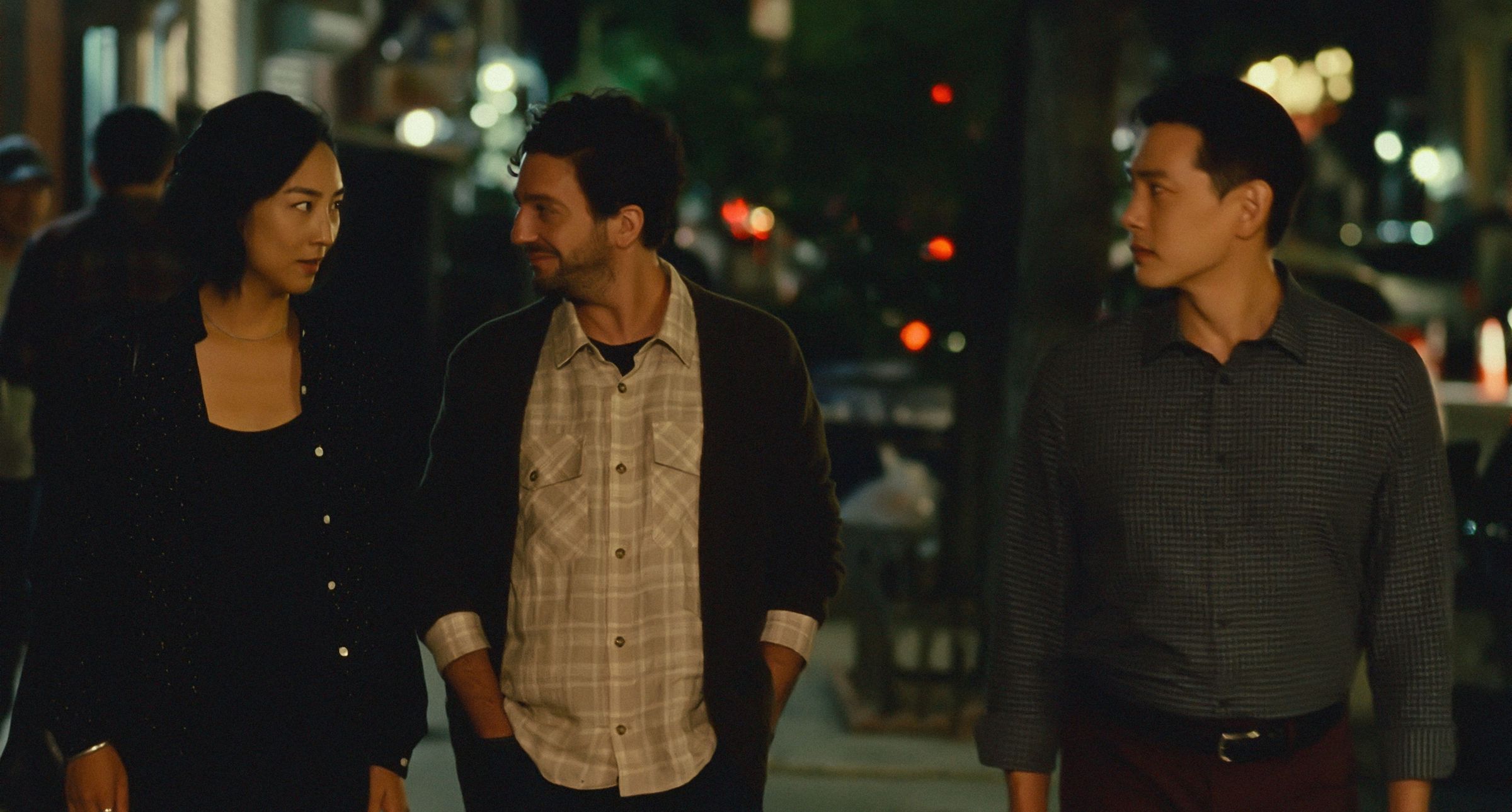
Toward the end of the A24 romantic drama Past Lives, there comes a scene in which silence speaks louder than words. For 45 long seconds on-screen—written as two minutes in the script—Nora (Greta Lee) and Hae Sung (Teo Yoo) stand, at first facing the street, then gradually, almost imperceptibly, shifting to face each other.
They’re waiting for an Uber to arrive to take one of them to the airport. The actors, just like their characters, didn’t know when the car was going to come. The director, Celine Song, made a tiny gesture to cue the car when she was ready.
“The way that I could decide when that was, is knowing what those two minutes have to be, which is that it has to feel—just like the movie—like eternity and decades and a person’s whole life,” Song says between sips of a green smoothie in a coffee shop in Manhattan’s East Village. “But also [it has] to feel too short.”
Past Lives, which opens in limited release on June 2 before expanding nationwide June 23, is a grown-up love story about, among other things, time and the way it moves. Twice, the words “12 years pass” appear on-screen. That really is how life feels, says Song: Sometimes 12 years flash by in the blink of an eye, other times one minute can feel like a hellish decade, and still other times a magical moment can feel like a welcome eternity.
In the film, which premiered at Sundance to raves, we first meet Nora as a kid (played by Moon Seung-ah), before she changes her name from Na Young to Nora and immigrates with her family from Seoul to Canada—but not before she develops a crush on her friend Hae Sung (Seung Min Yim) at school. Before her family leaves, her mom arranges a chaperoned “date” between Nora and Hae Sung in a Seoul park to help her file away good memories of Korea.
Twelve years later, Nora has immigrated again to New York City, where she is pursuing a bright career as a playwright. Hae Sung, now finishing mandatory military service in South Korea, finds her on Facebook, the two reconnect, and Skype hangouts ensue. But Nora wants to fully commit to her life in New York, so she ends the fledgling relationship and heads to an artist residency in Montauk, where she meets and falls for another writer, this one a white American man, Arthur (John Magaro). Another 12 years later, Nora and Arthur are married, and Hae Sung is coming to visit New York, their first meeting in 20 years.

The movie is a work of autofiction: It follows the broad brushstrokes of Song’s own life. At age 12, she too immigrated from Seoul to Canada. She studied theater at Columbia University in New York City, reconnected with her childhood sweetheart over Skype, then met her now-husband, the writer Justin Kuritzkes, at a fellowship retreat (from the Edward F. Albee Foundation) in Montauk. They got married four years later. Two years after that, her childhood sweetheart came to visit New York.
Song clarifies that there is the truth at the heart of the story, and then there are the facts. The director, wearing a navy blue baseball tee with Pink Floyd’s Wish You Were Here album cover on the front, her bob tucked under a dark green baseball cap, explains that in making her debut film, she was less interested in recreating exact replicas of characters and places, and more invested in the best way to tell the story.
“The main thing that I believe as an artist is that I cannot let other people’s limitations of imagination dictate my imagination,” Song says. “All I can do is hope that there are people who can meet the movie as alive as I have made it.”

One could read a summary of the movie’s plot and conclude that it’s a story about a lost woman trying to carve out her own identity through her relationships with men. But for Song, and for Lee, it is about a happily married woman who knows what she wants out of life, both personally and professionally. She’s ambitious, she’s clear, and she’s on the cusp of a reunion with someone important from her past.
“What I loved from the jump with this movie was it wasn’t in service of any sort of gaze: white gaze, male gaze,” Lee says in a video interview from a parked car, greenery behind her. “It was really liberated from the certain systems and infrastructures in place.”
“It really is all in service of this universal idea of love,” she continues. “Love not as some sort of neat construct, but something that exists on its own.”
In separate conversations, both the director and the actor who plays a version of her talked about the concept of faith as integral to the movie. For Song, it was an act of faith to believe that if a story feels true and compelling and important to her, then it will feel the same to the audience. She trusts that this very specific story will read as universal, “because I know that I’m a part of this universe in a pretty fundamental way.” For Lee, the faith came from an approach Song used in the making of the film: she kept the two leading men completely separate until their characters met on-screen to make the meeting feel genuine. Lee felt like she was in two different movies with them, but she had to trust that “that was the essence of the movie that we were after.”

Song and Lee speak like they’re in conversation with each other even when they’re not—which makes sense, given each one’s connection to the character of Nora. Unlike Nora, Lee was born in Los Angeles to Korean parents, but she understands the shared experience of having “this part of my identity that, at different points in my life, [has] been—not closed off, but let go—in order to make space for something else.”
There’s a scene that bookends the film in which Nora, Hae Sung, and Arthur sit at an East Village bar, inspired by the speakeasy Please Don’t Tell in Song’s real life. Song felt a visceral power sitting in the middle of her husband and her childhood sweetheart, the only reason why both of them were in that bar on that night, the bridge for language between them. Lee portrays that quiet power and self-assurance masterfully, cool and calm in a complicated situation.
Lee’s Nora is grounded, and she accepts the Korean concept of in-yun in its passivity. Earlier in the movie, Nora explains in-yun to Arthur as providence or fate: “If two strangers walk by each other in the street and their clothes accidentally brush, that means there have been 8,000 layers of in-yun between them.”
It’s easy to think about fate or destiny as something you go get, sometimes you run toward, Song says.
“But the truth is, in Eastern philosophy, where in-yun comes from, it is something that comes to you, and you cannot stop it,” she says. “It’s something that you have to learn how to accept.”
More Must-Reads From TIME
- The 100 Most Influential People of 2024
- Coco Gauff Is Playing for Herself Now
- Scenes From Pro-Palestinian Encampments Across U.S. Universities
- 6 Compliments That Land Every Time
- If You're Dating Right Now , You're Brave: Column
- The AI That Could Heal a Divided Internet
- Fallout Is a Brilliant Model for the Future of Video Game Adaptations
- Want Weekly Recs on What to Watch, Read, and More? Sign Up for Worth Your Time
Contact us at letters@time.com